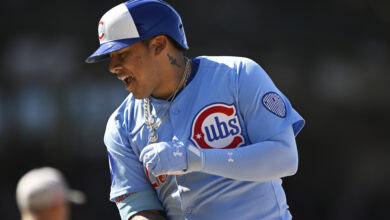
After Declining Option, LHP Yusei Kikuchi Feels Like Potential Cubs Target
Based on everything we think we know about the Cubs’ plans for this offseason, it sure feels like lefty starter Yusei Kikuchi should be on their radar now that he’s become a free agent. Assuming he’s amenable to playing in the Midwest, or remaining Stateside in general, he seems to check pretty much every box on the list. But what are those boxes, exactly?
First, Jed Hoyer has already stated publicly that the Cubs are searching for power pitching this winter. Kikuchi’s fastball averaged 95.2 mph over 29 starts for the Mariners last season, which is significantly harder than anyone the Cubs used last season. Even young pitchers Adbert Alzolay (94.2), Justin Steele (93.1), and Keegan Thompson (93.9), all of whom were able to cut it loose in relief didn’t come close.
Kikuchi is also a lefty, which helps his cause. The Cubs only have Kyle Hendricks locked into a spot right now and Steele is really the only other southpaw in-house with a shot at the rotation for 2022. Brailyn Márquez is still a pipe dream at this point, having missed all of the ’21 season after making just the one appearance last year, and it’s feeling more and more like he could move to the bullpen.
That sounds better than saying he’ll be put out to pasture in the arm barn.
Now we get to price, which is where the rubber really meets the road on a couple different fronts. Kikuchi turned down a $13 million option for ’22 after the M’s understandably declined their own four-year, $66 million option, making it highly unlikely he’ll receive a qualifying offer. The Cubs probably aren’t signing anyone shy of an uber-elite free agent — Carlos Correa, Corey Seager — who’s got a QO attached, so there’s no roadblock here.
Yusei Kikuchi has informed the Seattle Mariners that he has declined his player option. He’s a free agent.
— Robert Murray (@ByRobertMurray) November 3, 2021
The other big key here is that Kikuchi will turn 31 in June, something that will limit his suitors and his potential for a long-term deal. For a Cubs team that has a window of 3-5 years within which new GM Carter Hawkins and a revamped front office need to start paying big dividends, it makes a ton of sense to target transitional starters on 2-3 year deals.
Further limiting Kikuchi’s earning power is a stat line that was worse than league average for starters pretty much across the board. His 4.41 ERA (average MLB starter 4.34) and 4.61 FIP (MLB 4.30) were far from exemplary, his 1.55 HR/9 (MLB 1.33) and 9.3% walk rate (MLB 7.8%) were elevated, and his 47% hard contact allowed (MLB 39%) was alarming.
However, Kikuchi was better than average with a 24.5% strikeout rate (I’ll stop with all the league comps here, so just trust me), 12.5% swinging-strike rate, and 48.4% groundball rate. Outside of the 50.9% grounder rate from Alec Mills, Kikuchi’s numbers are better than every semi-regular Cubs starter from ’21 in all three of these categories. Barring some sort of dramatic drop-off in performance, this would be an immediate upgrade.
“You need power arms to win in today’s game,” Hoyer said during his year-end presser. “You need to be able to miss bats. The makeup of our staff this year was too contact-oriented, so to speak, and that’s something that needs to change.”
As for those less savory numbers, well, the Cubs wouldn’t be able to afford Kikuchi otherwise. But there could also be tremendous upside because the lefty appeared to have fallen off badly in terms of his secondaries last season. And when you’re talking about 64% of his repertoire, that tends to be a problem. The slider that makes up about 20% of his offerings wasn’t a good pitch, the splitter/change was merely okay, and the cutter he threw almost as much as his fastball was pedestrian at best.
What if pitching coach Tommy Hottovy and the mad scientists from the pitch lab can pinpoint mechanical, grip, or sequencing changes that could get those pitches working more effectively? Just because a guy is on the wrong side of 30 doesn’t mean he’s devoid of potential.
I’m sure the prevailing sentiment among readers will be that Kikuchi is too old or not good enough for the Cubs to be pursuing, but I honestly can’t think of many better fits — hard thrower, depressed market, no QO, right age — for what this team wants right now. They need hard throwers who can miss bats and who aren’t looking for either too much money or too many years. Of course, they also need that player to want to sign with them.

